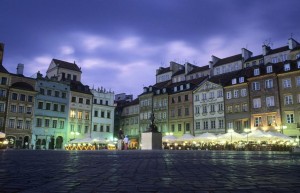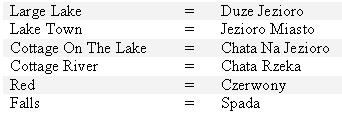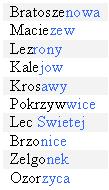 Often when we name a place in a campaign setting, we pick something that “sounds cool,” whether cool is an evocative name like “Dark Skull Peak” or just a combination of sounds that sounds neat. While this will usually work fine, if you’re trying to make a given fantasy culture feel exotic or foreign, it helps to make the names of things match both the cultural theme and be consistent throughout the region. I’ve developed two simple methods which result in names that sound like they could be real, but aren’t.
Often when we name a place in a campaign setting, we pick something that “sounds cool,” whether cool is an evocative name like “Dark Skull Peak” or just a combination of sounds that sounds neat. While this will usually work fine, if you’re trying to make a given fantasy culture feel exotic or foreign, it helps to make the names of things match both the cultural theme and be consistent throughout the region. I’ve developed two simple methods which result in names that sound like they could be real, but aren’t.
First, you need a culture that the locations you’re naming are all from. I’ll leave the details of creating a fictional culture for another time, so let’s just say that the culture in question is based on Poland. Okay, we have this imaginary culture that’s “kinda like Poland” and we have say, 10 places that need names which sound Polish without being actual place names from Poland. For this I use one of two methods.
Method One : Translation
For this I use an online translation tool like Google Translate. Just type words or phrases that could be place names and translate them into Polish. Here are a few test translations.
Not everything will translate properly or look and sound good, be prepared to play around with it for a while until you get a few that you like. I usually make more than I need so that I can pick and choose afterward. From the above results, I would only pick “Chata Na Jezioro”, “Chata Rzeka” & “Czerwony” to use.
Method Two : Chop & Splice
For this method, we need a map of Poland. Google Maps works well for this. Go to Poland and zoom in until you can see lots of place names for both cities and villages. Copy place names that you like into a text editor. Grab 2-3 times more than you will actually need. The more the better, really. Here’s what I grabbed.
Now, the whole point is to NOT use actual place names, so we need to turn this list into a tool for generating names. Review your list and look for any patterns in how the names are assembled. From my list I note that there are several recognizable endings that are used repeatedly, “kow”, wice”, “ierz”, “erz”, & there are other endings like “owa”, “jow”, “kow”. Let’s split our names into chunks that can be repeated in different combinations. I find doing this in a spreadsheet is helpful, but not necessary. Here’s the same list chopped up into lists of beginnings and endings, with both lists sorted alphabetically and any duplicates removed.
Now randomly join beginnings and endings. Here’s some that I generated just by rolling a couple of dice, I’ve coloured the two halves to show the joins.
In some cases the names are good to go, “Zelgonek” for instance, while others may need a little bit of attention to flow smoothly, “Pokrzywwice” becomes “Pokrzywice” and “Ozorzyca” becomes “Ozorizyca” for example. With minimal effort you’ll have plenty of authentic sounding place names. The more seed name you use, the better results you’ll get from this method. Also, depending on the culture you’re borrowing from, you may want to break names up into more than just two pieces. Either way, the method holds true.





Great idea. Second method give better results.
Grettings from Poland.
Don’t show this to any polish speaking player, or he will stop laughing a month after you campaign ends 😉
Now, seriously… first of all, google translator is not a good tool for translating Polish… try translating something back into English, and you’ll see what I mean.
Secondly, joining or just putting two polish words next to each other will produce only funny rubbish. In simple terms, there are deep changes in the word itself depending on their relation in a phrase. Ommiting that produces something which can be roughly compared to stripping English of all the pronouns.
Of course, if the result sounds good to you, safely forget what I said. This is generally a nice idea, I’ve done similar things with other languages I don’t know, and the result was likely the same. Just be warned that for any Polish speaker it is so hilarious that it would really ruin the mood of your campaign.
Ha ha! Well, it’s too bad I don’t know any Polish gamers, cause then we’d have a load of fun!
“Ozorzyca” becomes “Ozorizyca” not. Ozorzyca is quite correct xD
Greetings from Poland
Great idea. I like it.
I will write some greetings in polish becouse my english is bad
Jeśli interesują was polskie nazwy piszcie do mnie śmiało.
Pozdrawiam serdecznie z Polski.
Sebastian
I have fantasy (polish) names generator for you:
2d6
1.Jakub 1. Koprowski
2. Filip 2. Łuszczyk
3. Łukasz 3. Lenard
4. Kamil 4. Węgrzynowicz
5. Sławomir 5. Wrzesień
6. Sebastian 6. Wawrzyńczyk
Your barbarian elf hero can have a name like: Jakub Wrzesień 🙂
Dude. Why did you rape Polish?
Hello there,
On Abulafia you can find two Polish names generators, which were amended by an actual Polish-speaker 😉
http://random-generator.com/index.php?title=SGNP_polish – contemporary names generator,
http://random-generator.com/index.php?title=SGNP_Old_Polish – 16-17c. names generator,
Maybe someday I would write a generator for Polish toponyms 😉
l.
“Cottage On The Lake = Chata Na Jezioro”
It should be: Cottage On The Lake = Chata Nad Jeziorem
Other examples are quite good from non-Polish author. 😉
Greetings my Polish friends! I am honoured by all the attention my article is generating. I didn’t realize we had such a large Polish readership! I hope everyone enjoyed my article. Your comments are a mixture of entertaining and informative. I will answer your comments below.
First, I only used Polish words as an example. It was a random choice, I could have picked Serbian, Croatian, Tibetian, Swahili or any other language, so please don’t think that I had any Polish-related preference or agenda.
Second, I don’t speak Polish at all, not even a little. When I was creating the examples, I was only selecting words that sounded stereotypically Polish or exotic to me. Any language grammar mistakes are unintended. I’m not surprised that Polish speakers think my example place names sound funny.
Third, the purpose of this name generation method isn’t to create names that have perfect grammar. To do that would require fluency in every source language used for each of your fantasy cultures. My own homebrew fantasy campaign setting borrows language sounds from over 20 different real world cultures, both existing and historical and I am definitely not fluent in them all!! This method is only supposed to create names that feel similar to the source language and have a consistent style of sound throughout that same culture. This is why for my first method I suggest using Google Translate. For the purpose of making the fantasy place names it is fine. I would not rely on an automated translation tool for meaningful conversation in another language. I would expect Google Translate to make strange word combinations if used for that purpose. Personally, I prefer my second method, but I included both to provide a simple and fast alternate method to balance the more involved efforts of my second method.
Czesio: I agree with all of your comments. If I had Polish speakers in my group and I just HAD to have a polish-sounding fantasy culture in my campaign I would ask them to help me with the names to prevent it from breaking the mood of the game.
Sebastian: Thank you for the offer. I don’t need any Polish names, but if I do in the future, I will remember you.
Kuba: Thank you for the name generator, useful for any heroes from “Ozorzyca”! LOL! 😀
Grzegorz: I’m sorry if you didn’t like my Polish examples. I wasn’t trying to create perfect Polish writing, just words that had a polish-like sound to them. Also, as I say above, I wasn’t deliberately targetting Polish, I only randomly picked that language as an example language. I visited Poland as a teenager in the 80’s and really liked the country, so I don’t have anything against Poland. I could have just as easily used any language for my examples. 🙂
Michal: Thank you for the correction and the compliment. I hope that people will find my techniques useful, no matter what language they use as the source language.
Dude. Next time pick Swahili. You will be surprised by the volume of your readership.
Dude! I have one question… you are not fluent in polish right? How will you know how to read “Ozorzyca”, “Świniowice”, “Twoja Stara” or “Tupadły”?
And I mean not only polish! You use about 20 different cultures in your setting – all have different pronunciation… I’ts kinda big issule I think…
BTW. I’m polish myself ;D
@ Headbager – It’s kind of NOT an issue.
The post is NOT explaining how to speak Polish, or tanslate real-world Polish names into meaningful names in a fantasy game. The post is about coming up with *fantasy* names for your fantasy game, regardless of what they actually mean.
I imagine it can be hard to come up with a bunch of fake names and words for your game, and have all of them sound similar is some fashion (to reflect a certain artificial culture in a game). The point is not to be true to any “exotic sounding* language, but to draw insiration from it.
Exactly Jozef, that is correct, giving each fantasy culture a distinctive sound is very important in establishing how the players will react to that culture, and more important than the exact pronunciation. It’s not the only method, but it is important. Imagine the difference in how a country feels if instead of visiting Paris and Bordeaux, you are visiting “Center City” and “Wineville”. Now imagine trying to quickly display the differences between two different fantasy cultures if both of them are named that way.
Also, once your players become familiar with the naming styles of your various cultures, you can use the naming styles to drop hints about the setting. Imagine if in a fantasy french culture, the players visit a town with an obvious chinese sounding place name. Furthermore, if this town is near the border between the french culture and the chinese culture, the players may wonder at the history of the area…
If anyone would like to read some polish names with “polish-like” pronunciation, just use GoogleTranslate and practice with sounds generator.
Oh… I’ve never thought about that this way… You know we mostly play New World of Darkness, so this isn’t anything common for me and my crew. Only “oriental fantasy” game we play is Warhammer, and german pronunciation isn’t anything uncommon for us (not like we have to get far to visit them). That solves the case… Eather way, keep up the good work – doing stuff like this you allways are learning something, whitch is good. 🙂
As stated second option is far better due to one main reason. Slavic languages differ from Germanic mainly in declension.
Naming patter for places, especially in eastern Europe, comes from the name of main product being made there. Be it drink, food, minerals, animals. Due to change in person and/or plural as well as part of the speech outcome is a name that’s not used in regular language in most cases.
While second option might seem like it’s producing gibberish, it actually yields better results. First one gives too specific and simple output.
I believe it should apply to most of the places where language has Slavic roots.
Besides. If you need more accurate names, just google around and find some major news site about RPG in that language. Contact them and ask if they have generator for native names. In most cases there should be at least one.
Cheers mate.
Those guys from Poland are realy funny 🙂
I understand your reasons, but you should keep in mind to be more careful and at least aply some basic research – for example “cz” is a consonant in polish (spelled “tch”) and dividing “Leczyca” into “Lec” and “Zyca” makes no sense – or even worse, sometimes it DOES have some completely random meaning.
It’s not a big problem until someone familiar with the language tries to join the party and points out that you’ve named your PC comes from a town called “To Lay of the Saint” (Lec Swietej, give or take Polish diacritic marks). Ale I’m kinda certain that other languages could be likewise as tricky;P.
Also – “Gora Swietej” is not even a full name. “Swietej” is a feminine genitive of the word “saint”. It’s Probably Gora Swietej Anny – St. Anna’s Mountain.
You should be aware that at this point the entire Polish fandom anticipates future developments of your outstanding generator. Keep us updated!
[…] konkretne, skupiają się na jakimś problemie który może występować podczas gry. Nawet notka Making Place Names Match a Cultural Theme jest konkretna. Autor nie pisze by użyć translatora google (link do translatora). Podaje […]
Not sure if anyone is looking at this page these days, but…
I’ve used Google Translate to come up with character names, typically by plugging the character’s traits into multiple languages. It’s quick, easy, and makes for more creativity than I could come up with on my own.
For example, with a halfling rogue, I played with the English words “dexterous,” “sly,” and other appropriate terms. I finally chose the name “Winzig,” which is German for “tiny.” (Well, according to Google Translate…) It spoke to me as a good name for such a character.
Another I came up with in ten seconds just now: “Malakas,” derived from Filipino as a translation of “mighty.”
I can’t tell you how many times I’ve started play with either no name or something that I’ve regretted…
Google Translator… check!